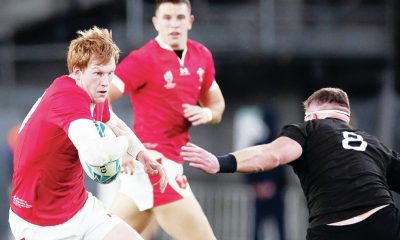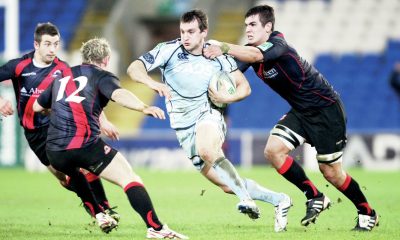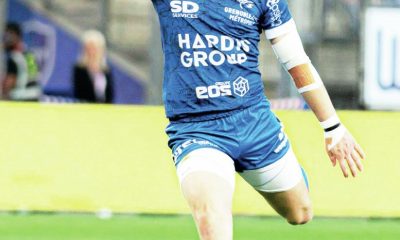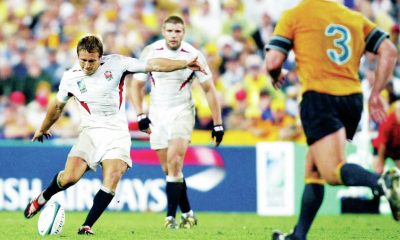
PETER JACKSON
THE MAN TRULY IN THE KNOW

THOSE planning this year’s Golden Jubilee of the 1974 Lions would have considered placing six empty chairs at strategic points around the dinner table in honour of fallen comrades.
Now they will have to make room for a seventh. JPR Williams’ death last Monday evening has shaken the surviving Invincibles as much as it has shaken those who never met him, old team-mates and fans who marvelled at his aura of indestructibility, now united in mourning at his loss.
The 50th anniversary reunion will, of course, proceed at a five-star venue near Belfast in June, doubling up as a poignant salute to the greatest of all Lions’ full backs, fearless and fearsome in equal measure. They will acknowledge him as the game’s supreme warrior, the indomitable symbol of their collective rampage round South Africa for three months half a century ago.
None will dare question JPR’s supreme status as ‘the competitor of competitors’, an accolade bestowed upon him by the late Carwyn James, the cerebral coach of the Lions in New Zealand three years earlier when his compatriot’s famous longrange drop goal clinched the series victory over the All Blacks, still the only one.
History might have taken a very different course had James not taken evasive action to protect the Lions from over-exposure to JPR’s relentless ferocity. Aware that the medical student went into every tackle as if his life depended on it, James decided he had to eliminate the risk of the other 29 Lions being hit by friendly fire.
“He banned me from Monday training because I was injuring too many of our own players,’’ JPR told me years later. “I was phenomenally fit then and I used to do a lot of scrummaging against the front row.
“I remember once tackling John Spencer, then the England captain, when he came back inside and hurting him as a result. There were a few other heavy tackles and so for most of the tour I spent Mondays swimming.
“We had a ‘Sunday school’ where the boys liked to have a few beers. So not having to get up as early as the rest on Mondays made it a very relaxed start to the week. But I’d sooner have been training.’’
The game had never seen anyone like him. He earned the right to be described as its supreme warrior, not simply because he never knew what fear meant, nor that he gave every appearance of being impervious to pain but also because of a winning mentality forged in iron.
Bridgend v New Zealand, December 1978, provided a gruesome example. A stud belonging to All Blacks prop John Ashworth leaves a gaping hole in one side of JPR’s face. He loses two pints of blood and rushes back into the match within 20 minutes, his face held together by 30 stitches inserted by his father and three brothers, Phil, Chris and Mike, all doctors.
Growing up at a time and place surrounded by contemporaries from a working-class background, the teenaged John Williams was acutely aware that he came from a different social strata.
“Because I came from a middleclass family I was that much more determined to prove myself, to prove that I wasn’t the boy with the silver spoon in his mouth. I think that’s why I became so brave on the field. “My father (Peter) was a super tennis player but I got the competitive instinct more from my mother (Margaret), a Lancashire lass from Rochdale. She gave me a will to succeed. I was brought up to take whatever I did in my stride.’’
The ‘Lancashire lass’ had learnt how to do that in traumatic circumstances as a medical student at Manchester University. There is a treasured family story of how she qualified as a doctor despite the building having to be evacuated halfway through her final exams because of a Luftwaffe bombing raid during the Manchester Blitz.
When the eldest of her four sons reported for the final Wales schoolboy trial at the old mining village of Blaina during the mid-Sixties, his mode of transport left the rest in no doubt he had come from a different class. Another John Williams had just arrived from his home in Nantyffyllon in a ‘humble’ Ford Prefect.
“We’d just pulled into the car park when along came a Rolls Royce,’’ said the boy whose advent in the Wales team would lead to his being renamed JJ and his namesake JPR. “I’d never seen a car as big and as grand because Nantyffyllon wasn’t exactly crawling with them back in my youth just as it isn’t crawling with them today.
“A few boys jumped out of the back of the Rolls followed by the boy who was to play behind me at full back. And that was when I first met John Peter Rhys Williams.’’
Even then, long before his initials became the most instantly identifiable in a sports context, the embryonic rugby player had aimed to be a hit in a different arena, on the tennis court. Winning a junior title at Wimbledon left nobody in any doubt about his ability.
In pursuit of that ambition, JPR won a place at the first professional tournament in the UK, the British Hard Court Championships at Bournemouth in April 1968. His first round opponent, the vastly experienced Australian Bob Howe, had twice been a Wimbledon semi-finalist.
Despite losing in straight sets, the Welsh teenager won seven games and a cheque for £20 which he accepted only after being assured by the Welsh Rugby Union that it would not compromise his amateur status. He had another match that day, one of such significance that it would end his tennis ambitions.
Bridgend were playing Newport that evening which meant a 120-mile dash from the south coast. The Welsh selectors, the revered Big Five, turned up at The Brewery Field en masse for one last look at candidates for that summer’s tour of Argentina. JPR made it in the nick of time, Bridgend won by a landslide and the selectors decided there and then that they had found their full back for the next ten years, if not longer.
Standing out in the greatest Welsh teams of the post-war amateur era seemed impossible given the competition, Gareth Edwards, Gerald Davies, Barry John, Phil Bennett and the rest of the galaxy. Standing out was exactly what JPR did while qualifying as an orthopaedic surgeon.

He was the rock on which Wales of the Seventies were built. He was there at the start of the decade and the only one of the founder-members still there at the end. Along the way he redefined the role of the full-back, from a safety-first defender who kept a respectable distance behind his three-quarters to a buccaneer who ran high balls back at the opposition from anywhere and everywhere.
As the one constant in the Welsh constellation of the Seventies, JPR collected 16 major honours: seven Five Nations titles, six Triple Crowns, three Grand Slams plus a starring role in the two greatest Lions tours of all time.
Truly great players deliver on the great occasions. JPR did that most famously with the drop goal in the fourth and final Test against the All Blacks in 1971, enough for the Lions to clinch the series. What’s more, he told the players on the team bus heading for Eden Park that he would do exactly that.
They didn’t believe him until the man himself let fly from the best part of 50 yards with the series in the balance. They believed him for the rest of his days and when the Invincible survivors reunite this summer, they will feel his presence all around them.



Latest News
test tags

Miscellaneous
The Best Rugby Themed Games
Features
OSCAR WILSON


























You must be logged in to post a comment Login